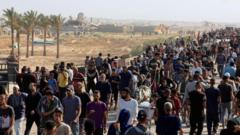The call comes following Israel's second-place finish at Eurovision, amidst criticism of its military actions in Gaza.
**Spanish Prime Minister Advocates for Israel's Exclusion from Eurovision Amid Gaza Conflict**

**Spanish Prime Minister Advocates for Israel's Exclusion from Eurovision Amid Gaza Conflict**
Pedro Sánchez calls for consistent policies, likening Israel's situation to Russia's ban from international competition.
In a bold statement, Spanish Prime Minister Pedro Sánchez has urged the European Broadcasting Union (EBU) to prohibit Israel from participating in the Eurovision Song Contest, invoking principles of consistency in international policies. His comments follow Israel's second-place achievement at the recent competition in Switzerland. Sánchez drew parallels between Israel's actions and the ban imposed on Russia since 2022 due to its invasion of Ukraine, insisting that double standards in cultural events should not be tolerated.
Sánchez's remarks were made during a press conference in Madrid, where he expressed solidarity with the Palestinian people and emphasized Spain's commitment to international law and human rights. He stated, "Nobody was up in arms when the Russian invasion of Ukraine began... Therefore Israel shouldn't either," reinforcing the notion that cultural representation should reflect ethical standards on the global stage.
Israel's participation in the contest received notable public support, as Spanish viewers awarded it the maximum 12 points through the televote. However, Sánchez faced ridicule from Israeli officials, particularly from diaspora affairs minister Amichai Chikli, who interpreted the strong viewer support as a direct contradiction to Sánchez's viewpoint. The Israeli government expressed disappointment over Sánchez’s labeling of Israel as a “genocidal state,” leading to a formal protest by summoning the Spanish ambassador for a reprimand.
Compounding the tensions, Spain's national broadcaster, RTVE, aired a supportive message for Palestinians just before the Eurovision event, despite guidance from the EBU to refrain from political commentary related to Gaza. In contrast, Spain's own entry, a performance titled "Esa Diva" by Melody, finished at the bottom of the rankings, placing 24th.
With Spain's political landscape increasingly vocal about the ongoing Gaza conflict, Sánchez’s proposal raises questions about the intersection of culture, politics, and international representation and whether the arts should serve as a platform for broader geopolitical stances. As the conversation continues, Sánchez’s remarks reflect a growing commitment among certain European leaders to address perceived injustices through international cultural forums, potentially influencing future participation in events such as Eurovision.
Sánchez's remarks were made during a press conference in Madrid, where he expressed solidarity with the Palestinian people and emphasized Spain's commitment to international law and human rights. He stated, "Nobody was up in arms when the Russian invasion of Ukraine began... Therefore Israel shouldn't either," reinforcing the notion that cultural representation should reflect ethical standards on the global stage.
Israel's participation in the contest received notable public support, as Spanish viewers awarded it the maximum 12 points through the televote. However, Sánchez faced ridicule from Israeli officials, particularly from diaspora affairs minister Amichai Chikli, who interpreted the strong viewer support as a direct contradiction to Sánchez's viewpoint. The Israeli government expressed disappointment over Sánchez’s labeling of Israel as a “genocidal state,” leading to a formal protest by summoning the Spanish ambassador for a reprimand.
Compounding the tensions, Spain's national broadcaster, RTVE, aired a supportive message for Palestinians just before the Eurovision event, despite guidance from the EBU to refrain from political commentary related to Gaza. In contrast, Spain's own entry, a performance titled "Esa Diva" by Melody, finished at the bottom of the rankings, placing 24th.
With Spain's political landscape increasingly vocal about the ongoing Gaza conflict, Sánchez’s proposal raises questions about the intersection of culture, politics, and international representation and whether the arts should serve as a platform for broader geopolitical stances. As the conversation continues, Sánchez’s remarks reflect a growing commitment among certain European leaders to address perceived injustices through international cultural forums, potentially influencing future participation in events such as Eurovision.




















